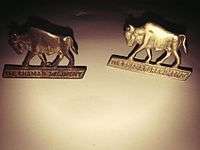Chamar
%2C_f.360v_-_BL_Add._27255.jpg) Leather-bottle makers (Presumably members of the ‘Chamaar’ caste), Tashrih al-aqvam (1825) | |
| Regions with significant populations | |
|---|---|
| India • Pakistan | |
| Languages | |
| Punjabi • Urdu • Hindi | |
| Related ethnic groups | |
| other Ramdasia Ravidassia Julaha |
Chamar in other word's is know as Jatav. Who are now classified as a Scheduled Caste under modern India's system of positive discrimination.They were traditionally considered outside the Hindu ritual ranking system of castes known as varna. They are found mainly in the northern states of India and in Pakistan[1][2] and Nepal.
Ramnarayan Rawat posits that the association of the Chamar community with a traditional occupation of tanning was constructed, and that the Chamars were instead historically agriculturists.[3]
The term chamar has also been derived from the Sikh Guru Ravidassia.[4]
Demographics
According to the 2001 census of India, the Chamars comprise around 14 per cent of the population in the state of Uttar Pradesh[5] and 12 percent of that in Punjab.[6]
|
||||||||||||||||||||||||||||||||||||||||||||||||||||||||||||||||||||||||||
Occupations
Chamars who have adopted the weaving profession and abandoned tanning and leathercraft, identify themselves as Julaha Chamar; R. K. Pruthi suggests this is in the hope that they might in future be considered as Julaha by other communities in the future.. They believe that leatherwork is "degrading" when compared to weaving.[26]
Military
Sikh Light Infantry
The Sikh Chamar Ravidassia has a history of military service, including in the Sikh Light Infantry (composed of lower caste- Majhabi and Ravidassia Sikhs).[27]
Chamar Regiment

The 1st Chamar Regiment was an infantry regiment formed by the British during World War II. Officially, it was created on 1 March 1943, as the 27th Battalion 2nd Punjab Regiment was converted.[28] The Chamar Regiment which was involved in the Pacific War Japanese front and was awarded the Battle Honor of Kohima for theirs distinguished role in the Battle of Kohima.[29] The Regiment was disbanded in 1946.[30] Recently, several politicians have demanded that The Chamar Regiment be revived.[30]
Notable people
- Kanshi Ram (1934–2006), founder of Bahujan Samaj Party and mentor of Mayawati Kumari[31]
- Jagjivan Ram (1908–1986), first Labour Minister of India, former Defence Minister of India, former Agriculture Minister of India, former Deputy Prime Minister of India and father of Meira Kumar[32]
- Mayawati, Leader of B.S.P, Chief Minister of U.P.[33]
- Meira Kumar, Ex.Speaker of Indian Parliament[34][35]
- Mohinder Singh Kaypee M.P Jalandhar[36][37]
See also
References
- ↑ "Pakistan's caste system: the untouchable's struggle". Retrieved 2013-03-30.
- ↑ "Socio-Economic Position of Leatherworkers in Gulbarga City" (PDF). Retrieved 2013-03-30.
- ↑ Yadav, Bhupendra (21 February 2012). "Aspirations of Chamars in North India". Chennai, India: The Hindu. Retrieved 2013-01-14.
- ↑ Singh, Sanjay L. (20 August 2008). "Calling an SC 'chamar' offensive, punishable, says apex court". The Economic Times. Retrieved 2015-08-12.
- ↑ "Uttar Pradesh data highlights: the Scheduled Castes, Census of India 2001" (PDF).
- ↑ "Uttar Pradesh data highlights: the Scheduled Castes" (PDF).
- ↑ "West Bengal — DATA HIGHLIGHTS: THE SCHEDULED CASTES — Census of India 2001" (PDF). Retrieved 2013-01-14.
- ↑ http://www.censusindia.gov.in/Tables_Published/SCST/dh_sc_bihar.pdf
- ↑ http://www.censusindia.gov.in/Tables_Published/SCST/dh_sc_delhi.pdf
- ↑ http://censusindia.gov.in/Tables_Published/SCST/dh_sc_chandigarh.pdf
- ↑ http://censusindia.gov.in/Tables_Published/SCST/dh_sc_chhattisgarh.pdf
- ↑ http://censusindia.gov.in/Tables_Published/SCST/dh_sc_gujarat.pdf
- ↑ http://www.censusindia.gov.in/Tables_Published/SCST/dh_sc_haryana.pdf
- ↑ http://www.censusindia.gov.in/Tables_Published/SCST/dh_sc_himachal.pdf
- ↑ http://censusindia.gov.in/Tables_Published/SCST/dh_sc_jk.pdf
- ↑ http://censusindia.gov.in/Tables_Published/SCST/dh_sc_jharkhand.pdf
- 1 2 http://censusindia.gov.in/Tables_Published/SCST/dh_sc_madhya_pradesh.pdf
- ↑ https://books.google.com/books?id=rTdnvQBPWIUC&pg=PA579&dq=balahi+chamar&hl=en&sa=X&ei=6BSSUq6BEMOTrgfIwICQDg&ved=0CEgQ6AEwBQ#v=onepage&q=balahi%20chamar&f=false|title=Balahi: Chamars employed to measure land.
- ↑ http://censusindia.gov.in/Tables_Published/SCST/dh_sc_maha.pdf
- ↑ http://www.censusindia.gov.in/Tables_Published/SCST/dh_sc_punjab.pdf
- ↑ http://www.censusindia.gov.in/Tables_Published/SCST/dh_sc_rajasthan.pdf
- ↑ Rawat, Shyam (2010). Studies in Social Protest. VEDAMS. ISBN 8131603318.
- ↑ Balai: Chamars in Bikaner region are known as Balai.
- ↑ http://www.censusindia.gov.in/Tables_Published/SCST/dh_sc_up.pdf
- ↑ http://www.censusindia.gov.in/Tables_Published/SCST/dh_sc_uttaranchal.pdf
- ↑ Pruthi, R. K. Indian caste system. Discovery. p. 189. Retrieved 2012-04-14.
- ↑ Wilkinson, Steven I. (2015). Army and Nation: The Military and Indian Democracy since Independence. Harvard University Press. p. 69. ISBN 978-0-67496-700-7.
- ↑ "Orders of Battle - 27/2 Punjab Regiment [British Commonwealth]". ordersofbattle.com. Retrieved 2011-03-31.
- ↑ "The Battle of Kohima" (PDF).
- 1 2 "RJD man Raghuvansh calls for reviving Chamar Regiment". indianexpress.com. Retrieved 2011-03-31.
- ↑ "I will be the best PM and Mayawati is my chosen heir". Indian Express. 2 May 2003.
...I am a chamar from Punjab...
- ↑ "I will be the best PM and Mayawati is my chosen heir". Indian Express. 2 May 2003.
...Jagjivan Ram, a chamar leader...
- ↑ "A Chamar will be my successor: Mayawati". The Hindu. Chennai, India. 29 August 2006.
- ↑ "Tytler's party list calls India's Speaker a Chamar". Retrieved 2013-01-14.
- ↑ "Cong's doublespeak on caste". Retrieved 2013-01-14.
- ↑ "Amarinder disregarded events organised by state unit, says Kaypee". Retrieved 2013-01-14.
- ↑ "Congress's dalit card turning against established dalit leaders of Doaba region". The Times Of India. 21 October 2012. Retrieved 2013-01-14.
Further reading
- Briggs, George W. (1920). The Religious Life of India — The Chamars. Calcutta: Association Press. ISBN 1-4067-5762-4.
- Rawat, Ramnarayan S. (2011). Reconsidering Untouchability: Chamars and Dalit History in North India. Indiana University Press. ISBN 9780253222626.
- Schmalz, Mathew N. (2004). "A Bibliographic Essay on Hindu and Christian Dalit Religiosity". Journal of Hindu-Christian Studies. 17: 55–65.